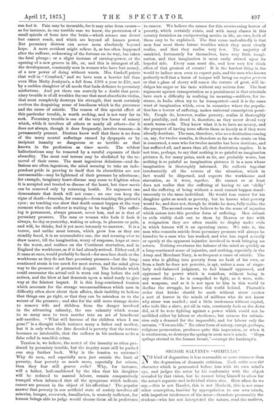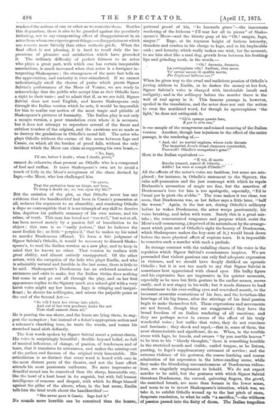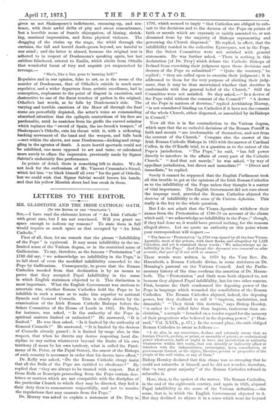SIGNOR SALVINI'S " OTHELLO."
NO kind of dogmatism is less reasonable or more common than the dogmatism of dramatic criticism. Each critic sees the character which is personated before him with his own mind's eye, and judges the actor by his conformity with the object revealed by that vision, but he cannot bring himself to allow for the actor's separate and individual vision also. How often do we say,—this is not Hamlet, this is not Macbeth, this is not some other conception, familiar by appropriation to our own minds, with impatient intolerance of the actor—therefore presumably the student—who has not interpreted the nature, read the motives, rendered the actions of one or other as we conceive them. Besides this dogmatism, there is also to be guarded against the peculiarly irritating, not to say exasperating effect of disappointment in an actor from whom one expects great things, —a disappointment which one resents more bitterly than other esthetic griefs. When the final effect is not pleasing, it is hard to recall duly the im- pressions of pleasure and satisfaction which have preceded it. The ordinary difficulty of perfect fairness to an actor who plays a great part, with which one has certain inseparable associations, is much increased when that actor is a foreigner in- terpreting Shakespeare ; the strangeness of the mere fact tells on the appreciation, and curiosity is over-stimulated. If we cannot unhesitatingly swell the chorus of praise which greets Signor Salvini's performance of the Moor of Venice, we are ready to acknowledge that the public who accept him as their Othello have a right to their taste ; and to admit that if, as we are told, Signor Salvini does not read English, and knows Shakespeare only through the Italian version which he acts, it would be impossible for him to realise our notion of the most tragic and pitiable of Shakespeare's pictures of humanity. The Italian play is not only a meagre version, a poor translation even where it is accurate, but it does not attempt to reproduce several of the finest and subtlest touches of the original, and the excisions are so made as to destroy the gradations in Othello's moral fall. The actor who plays Othello without the excuse of the scene between Iago and Cassio, on which all the burden of proof falls, without the only incident which the Moor can claim as supporting his own boast,— " No, Iago,
see, before I doubt ; when I doubt, prove,"
cannot do otherwise than present an Othello who is a compound of fool and ruffian. It taxes Shakespeare's own art to avoid a touch of folly in the Moor's acceptance of the sham devised by Iago,—the Moor, who has challenged him
"to prove,
That the probation bear no hinge, nor loop, To hang a doubt on; or, woe upon thy life !"
But the omission of the plot, so that Othello never has any evidence that the handkerchief had been in Cassio's possession at all, reduces the argument to an absurdity, and rendering Othello a dupe so contemptible that it is no triumph of any skill to deceive him, deprives his pathetic summary of his own nature, and his crime, of truth. This man has loved not "too well," but not at all, has been moved merely by a passion full of humiliation to its object ; this man is so "easily jealous," that he believes the most foolish lie ; so little " perplex'd," that he makes up his mind to murder Desdemona offhand. To form a fair judgment of Signor Salvini's Othello, it would be necessary to discard Shake- speare's, to read the Italian version as a new play, and to keep in mind that he knows no other. That version he realises with great ability, and almost entirely unsupported. Of the other actors, with the exception of the lady who plays Emilia, and who is admirably natural and forcible in the last scene, there is little to be said. Shakespeare's Desdemona has an awkward number of entrances and exits to make, but the Italian victim does nothing but come in and go out all through the play, and on her first appearance replies to the Signory much as a school-girl with a very harsh voice might say her lesson. Iago is cringing and insigni- ficant; he shouts his soliloquies, and misses the palpable point at the end of the Second Act :— " So will I turn her virtue into pitch;
And out of her own goodness make the net
That shall enmesh them all."
He is passing the sea-shore, and the boats are lying there, to sug- gest the metaphor ; but instead of a fisher's appropriate action and a schemer's chuckling tone, he rants the words, and tosses his stretched band aloft defiantly.
The first words spoken by Signor Salvini assert a potent charm.
His voice is surprisingly beautiful ; flexible beyond belief, so full of musical inflexions, of change, of passion, of tenderness and of tears, that it translates its utterances, and makes the missing-out of the pathos and finesses of the original truly lamentable. His articulation is so distinct that every word is heard with ease in the most distant parts of the theatre, and not the least effort attends his most passionate outbursts. No more impressive or dreadful sound can be conceived than the sharp, lamentable cry, like the howl of a hurt beast in its anguish, but with full human intelligence of remorse and despair, with which he flings himself against the pillar of the alcove, when, in the last scene, Emilia tells him the fatal truth about the handkerchief :— " She never gave it Quid°. Iago had it."
No sounds more horrible can be conceived than the hoarse,
guttural growl of his, "lo lacerarla giuro "—the inaccurate rendering of the hideous "I'll tear her all to pieces" of Shake- speare's Moor—and the thirsty gasp of his "Oh ! sangue, Iago, sangue !" Rage, at its topmost height of furious intensity, thunders and crashes in his charge to lago, and in his implacable oath ;- and ferocity, which really makes one wish, for the moment, to see him shot like a mad dog, growls from between his frothing lips and grinding teeth, in the words,—
" Oh! dannata, dannata,
La corteggiana vita! Andiam, vien niece. Vo' cercar mezzo di spedita morte, Per infernal bellezza sue l"
When he gives way to the cruel and malicious passion of Othello'st jeering address to Emilia, as he dashes the money at her feet, Signor Salvini's voice is charged with intolerable insult and. malignity, and in the soliloquy before the murder there is the wail of real agony in it. This famous passage is, however, spoiled in the translation, and the actor does not suit the action- to even the mutilated word, for though he apostrophises ' the- light,' he does not extinguish it.
" Ohl) spenga questa face, .E poi in vita sun,"
is one sample of the meagreness and missed meaning of the Italian, version. Another, though less injurious to the effectof the entire- passage, is the rendering of,—
" And, oh! ye mortal engines, whose rude throats The immortal Jove's dread clamours counterfeit, Farewell! Othello's occupation's gone!"
Here is the Italian equivalent :-
"E voi, di morte
Bocche tonanti, ntmzii di vittoria Addio! La vece si compii d'Otello!"
All the effects of the actor's voice are faultless, but some are mis- placed; for instance, in Othello's statement to the Signory, the' calm self-possession and the just contempt with which he repels Brabantio's accusation of magic are fine, but the assertion of Desdemona's love for him is too apologetic, especially, "Ed io l'amai per la pieta che n'ebbe." The tone makes it too clear, too soon, that Desdemona was, as her father says a little later, "half the wooer." Again, in the last act, during Othello's soliloquy before he wakes Desdemona, the actor weeps passionately, his- voice breaking, and laden with tears. Surely this is a great mis- take; the concentrated vengeance and purpose which resist the Moor's self-communing, (deprived of its naturalness by the arrange- ment which puts out of Othello's sight the beauty of Desdemona, which Shakespeare makes the key-note of it,) would break down before the mere physical effect of copious tears. It is impossible to conceive such a murder with such a prelude.
In strange contrast with the unfailing charm of his voice is the repulsion which Signor Salvini's countenance inspires. We are persuaded that violent passions can only find adequate expression in violence, and we should have deeply disliked an operatic Othello ; but it is not too much to say that Signor Salvini is sometimes best appreciated with closed eyes. His bulky figure and his expressive face are impressive in his quieter moments, especially as he uses but little gesture in the earlier scenes, moves. easily, and is not stagey in his walk ; but it needs distance to lend enchantment to his ever-rolling eyes and convulsed mouth, to the incessant muscular contortions of his face, and the leviathan-like hearings of his big frame, after the stirrings of his fatal passion begin to make themselves felt. These expressions and movements are not forced, though they are exaggerated ; they have the broad freedom of an Italian rendering of all emotions, and they are perhaps never in excess of the effect of his truly wonderful voice ; but unlike that voice, they do not convince and fascinate ; they shock and repel,—that is, some of them, the most characteristic and significant, do so. When, in the terrible scene with Iago, he kneels, and swears "by yon marble heaven"• to be true to his "bloody thoughts," there is something horrible in the stretched mouth and visible, curled tongue, as he listens, panting, to Iago's supplementary covenant of service ; and the extreme violence of his gestures, the coarse loathing and coarse admiration of his expression in the letter-reading scene, while they make the blundering unconsciousness of Desdemona ridicu- lous, are singularly unpleasant to behold. We do not expect murder to be mild, but the gestures with which Signor Salvini threatens Desdemona, the curved, quivering fingers, the growl, the snatched breath, are more than human in the lower sense, and seem to us to invert Shakespeare's intention, which was, we take it, to exhibit Othello wound up to the last pitch of stern, desperate resolution, to what he calls g‘a sacrifice,"—the wildness. of passion passed into the fixity of doom. The Italian tragedian,
gives us not Shakespeare's indictment, summing-up, aud sen- tence, with their awful drifts of pity and sweet remembrance, but a horrible scene of frantic objurgation, of hissing, shriek- ing, maniacal imprecation, and fierce physical violence. The .dragging of the victim up the stage, the whirl through the .curtains, the fall and horrid death-groan beyond, are hateful to our mind ; and the latter is absurd, because the original text is adhered to in respect of Desdemona's speaking again, her last .sublime falsehood, uttered to Emilia, which elicits from Othello that wonderful burst of fury and anguish yet unquenched by revenge,— "She's, like a liar, gone to burning hell!"
Repulsive and in our opinion, false to art, as is the scene of the murder of Desdemona, that of Othello's suicide is much more -repulsive, and a wider departure from artistic excellence, bad in ,conception, unpleasant to the point of disgust in execution, and destructive to one of the finest touches of pathos in the original, ,Othello's last words, as he falls by Desdemona's side. The varying and terrible emotions of the Moor all through the final .scene are powerfully depicted, the actor's voice so commanding absorbed attention that the epileptic contortions of his face are pardonable, until he snatches from his girdle the curved scimitar which replaces the "sword of Spain, the ice-brook's temper," of Shakespeare's Othello, cuts his throat with it, with a sickening, hacking movement of the hand and the weapon, and falls back —not within the alcove, not near Desdemona—kicking and strug- gling in the agonies of death. A more horrid spectacle could not be exhibited, one more opposed to art and taste, or calculated more surely to efface the impression previously made by Signor Salvini's undeniably fine performance.
In points of detail, there is something left to desire. We do not look for the enthusiasm of Mr. Vincent Crummles's friend, -which led him "to black himself all over" for the part of Othello, but we could wish that Signor Salvini would brown his hands, .and that his yellow Moorish shoes had less creak in them.




































 Previous page
Previous page